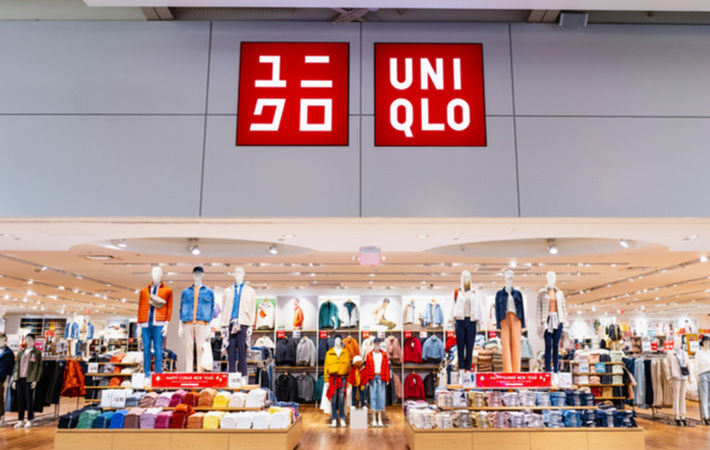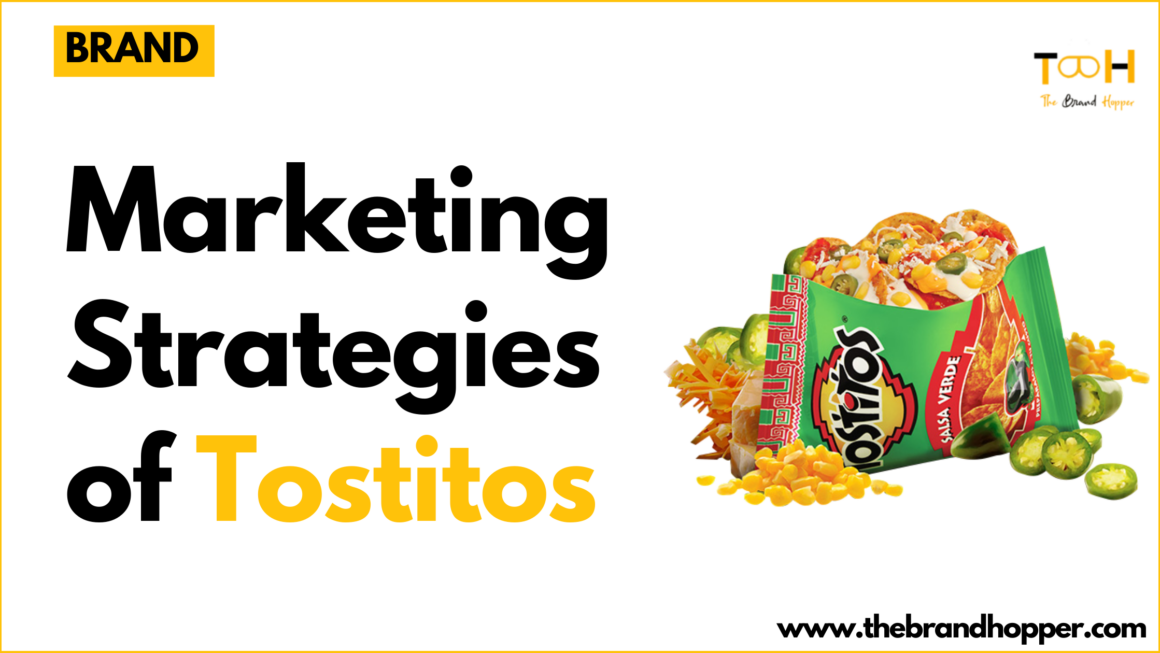Uniqlo is a Japanese casual wear company founded in 1949 by Tadashi Yanai. The company’s name is a portmanteau of “unique clothing”. Uniqlo is known for its simple, functional designs and its affordable prices.
Uniqlo’s products are made from high-quality materials, and the company is committed to sustainability. Uniqlo’s stores are located all over the world, and the company is one of the largest clothing retailers in the world.
Today, Uniqlo is one of the largest clothing retailers in the world. The company has over 2,300 stores in over 20 countries. Uniqlo’s products are also available online. The company’s annual FY2022 sales is ¥1.9290 trillion.
Uniqlo is known for its simple, functional designs and its affordable prices. The company’s products are made from high-quality materials, and Uniqlo is committed to sustainability. Uniqlo’s stores are located all over the world, and the company is a major force in the global fashion industry.
The company’s simple, functional designs have appealed to consumers all over the world. Uniqlo has also been credited with popularizing the “LifeWear” concept, which emphasizes the importance of comfort and functionality in clothing. Uniqlo’s affordable prices have made its products accessible to a wide range of consumers. This has helped to make Uniqlo one of the most popular clothing brands in the world.
Founding History of Uniqlo
Uniqlo, the renowned Japanese fashion brand known for its high-quality and affordable clothing, has a compelling founding history that traces back to its humble beginnings in Hiroshima, Japan.
Uniqlo was founded in 1949 by Tadashi Yanai as a small men’s clothing store named “Men’s Shop Ogori Shoji” in Hiroshima, Japan. At its inception, the store primarily sold men’s tailored suits. However, Yanai recognized the potential for growth by offering high-quality and reasonably priced clothing to the masses.
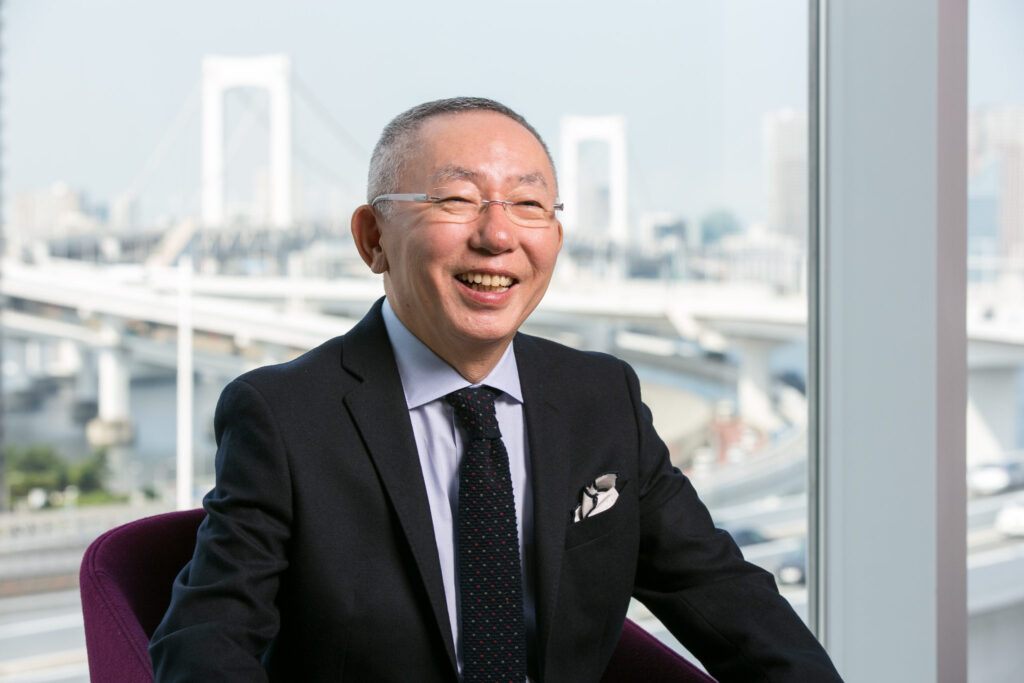
In 1984, the store underwent a transformation and was rebranded as “Unique Clothing Warehouse” or Uniqlo. The new concept focused on providing casual, everyday clothing for men, women, and children. Uniqlo aimed to deliver comfortable and functional clothing that catered to diverse lifestyles.
In the early 1990s, under the visionary leadership of Tadashi Yanai, Uniqlo adopted a revolutionary retail strategy called the “Fast Retailing” model. The model emphasized efficient production, distribution, and retailing processes, enabling the brand to offer high-quality products at competitive prices.
Uniqlo’s Fast Retailing model emphasized the value of simplicity, functionality, and practicality in its clothing, aligning with the needs of a modern and busy urban population.
Throughout the 1990s and early 2000s, Uniqlo experienced rapid expansion in Japan. The brand strategically opened stores in key urban centers and shopping districts, establishing a strong domestic presence. Uniqlo’s success in Japan was fueled by its ability to provide stylish and comfortable clothing that resonated with the Japanese market.
In the late 1990s, Uniqlo set its sights on global expansion. The brand opened its first international store in London in 2001, followed by stores in other major cities like New York, Shanghai, and Paris. Uniqlo’s international presence grew rapidly, and it gained recognition for its high-quality basics, innovative fabrics, and minimalist design philosophy.
Uniqlo’s global success was further bolstered by strategic collaborations and partnerships. The brand teamed up with renowned designers and celebrities to create exclusive collections, generating excitement and drawing attention to its offerings. Collaborations with designers such as Jil Sander, Alexander Wang, and Christophe Lemaire brought high fashion and creativity to Uniqlo’s affordable clothing.
Uniqlo’s commitment to technological advancements played a significant role in its success. The brand invested in fabric innovation, using cutting-edge materials and technologies to enhance the functionality and performance of its clothing. For example, the introduction of HEATTECH, a heat-retaining fabric, and AIRism, a breathable and moisture-wicking fabric, became widely popular and contributed to Uniqlo’s appeal in various climates.
In recent years, Uniqlo has also demonstrated a commitment to sustainability and social responsibility. The brand has undertaken initiatives to reduce its environmental impact, promote ethical sourcing, and implement eco-friendly practices in its operations.
Uniqlo’s founding history is a testament to the vision of Tadashi Yanai, who transformed a small men’s clothing store into a global fashion phenomenon. The brand’s emphasis on high-quality, functional clothing, and efficient retailing processes have been instrumental in its rise to become one of the world’s most recognizable and beloved fashion brands. With a strong commitment to innovation, simplicity, and sustainability, Uniqlo continues to shape the fashion industry and redefine the standards of accessible and stylish clothing for people worldwide.
Marketing Strategies of Uniqlo: Elevating Everyday Fashion through Innovation and Global Appeal
Uniqlo has successfully carved a distinct niche in the global fashion industry with its unique marketing strategies. Let’s delve into the detailed marketing strategies that have contributed to Uniqlo’s widespread popularity and success:
Emphasis on LifeWear Philosophy:
Uniqlo’s LifeWear philosophy represents a core component of the brand’s marketing strategy. It encapsulates several key principles that guide the creation and promotion of Uniqlo apparel. Let me break it down for you:
What is LifeWear?
LifeWear refers to high-quality, functional clothes designed to meet people’s daily needs without sacrificing comfort or style. Each item is intended to serve multiple purposes and adapt to different occasions, making it easy for consumers to mix and match pieces within their wardrobe.
Key Principles:
Comfort: Uniqlo prioritizes comfort in all its designs, using innovative fabrics and fits that ensure maximum ease and flexibility without compromising elegance.
Functionality: Clothes must fulfill practical requirements beyond just looking good. Features like moisture-wicking properties, UV protection, quick drying, and wrinkle resistance make Uniqlo items suitable for active lifestyles.
Affordability: Uniqlo offers accessible prices for premium quality merchandise, attracting a wide range of customers seeking stylish essentials without breaking the bank.
Seasonlessness: Uniqlo avoids strict adherence to seasonal trends, instead focusing on timeless styles that remain relevant year-round. This approach reduces pressure on customers to constantly update their wardrobes according to fleeting fashion cycles.
Universal Design: Uniqlo seeks to create clothes that appeal to diverse groups globally, taking inspiration from global fashion trends and incorporating versatile silhouettes and color palettes.
Sustainability: Uniqlo actively works towards more environmentally friendly practices, utilizing recycled materials and developing new low-impact dyeing processes to reduce its impact on the planet.
Marketing Implications:
By emphasizing these core values, Uniqlo positions itself as a reliable provider of essential clothing that meets people’s everyday needs without sacrificing style or affordability. Its target audience includes busy professionals, athletes, parents, and anyone seeking comfortable, versatile attire that can accommodate their dynamic lives.
Uniqlo leverages social media influencers, collaborations with renowned artists and brands (e.g., Andy Warhol, JW Anderson), and strategic partnerships with leading sports organizations (e.g., NBA, FIFA) to expand its reach and connect with potential customers around the globe.
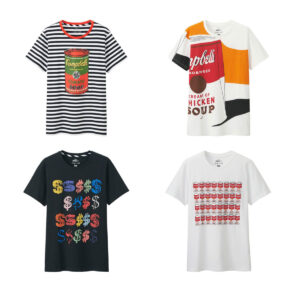
The brand also hosts annual events like Tokyo Fashion Week shows and releases exclusive collections tied to major movie franchises (e.g., Star Wars) to generate excitement and engage fans worldwide.
In summary, Uniqlo’s LifeWear philosophy serves as a cornerstone of its marketing strategy by offering customers well-made, adaptable clothing that balances comfort, function, and affordability. By staying true to these principles, Uniqlo cultivates a loyal following of individuals who appreciate its commitment to providing high-quality basics for everyday life.
Innovative Fabric Technology
Uniqlo has made significant strides in fabric technology research and development, which plays a crucial role in its overall marketing strategy. Here are some ways how innovative fabric tech acts as a marketing tool for the brand:
Differentiation: Uniqlo sets itself apart from competitors by investing heavily in R&D to develop cutting-edge textiles. The brand creates unique fabrics that offer distinct benefits such as heat retention/release, water repellency, quick drying, and anti-odor properties. These features not only enhance wearer comfort but also help position Uniqlo as a leader in the industry.
Premiumization: By introducing advanced technologies into its garments, Uniqlo elevates the perception of its products. Customers associate higher costs with better performance and durability, even if they don’t fully understand the science behind each fabric innovation. This premiumization strategy encourages shoppers to pay more for perceived quality improvements over cheaper alternatives.
Target Markets: Uniqlo focuses on specific customer segments when designing fabrics tailored to their needs. For example, the brand developed HEATTECH, AIRism, and Ultra Light Down lines catering to athletes, women, and outdoor enthusiasts respectively. By addressing niche markets, Uniqlo expands its customer base while showcasing expertise in meeting individual preferences.
Brand Image: Uniqlo presents itself as a forward-thinking company committed to pushing boundaries in fabric engineering. Through collaborations with external experts like Toray Industries and NTT Docomo, Inc., the brand gains credibility as an innovator embracing emerging technologies. Such associations strengthen Uniqlo’s image as a modern, tech-savvy label appealing to younger demographics.
Showcase through Events & Experiential Marketing: Uniqlo organizes initiatives like “UT Meets” workshops where participants learn about fabric creation and experiment with DIY projects using various materials. These hands-on activities demonstrate the brand’s passion for exploring novel ideas and invite attendees to experience the latest fabric technologies firsthand.
Collaborations and Limited Editions:
Uniqlo’s marketing strategy includes strategic collaborations and limited-edition collections. The brand partners with renowned designers, artists, and pop culture icons to create exclusive and collectible pieces.
Exclusivity Appeal: Collaborations create a sense of exclusivity among customers by offering one-of-a-kind or limited items designed in partnership with renowned brands, artists, or influencers. These co-created products capitalize on people’s desire for uniqueness and scarcity, driving demand and generating buzz around new product launches.
Extension of Core Values: Uniqlo chooses collaboration partners whose values align with its own vision of making clothes that are accessible to everyone, regardless of age, gender, ethnicity, religion, or occupation. By teaming up with diverse personalities and labels, the brand emphasizes inclusiveness and versatility in fashion choices.
Expansion of Customer Base: Collaborations attract new audiences to Uniqlo by leveraging the popularity of participating parties. When working with iconic Japanese designer Nigo or acclaimed British artist David Shrigley, the brand reaches fashion aficionados, art lovers, and cultural connoisseurs who might otherwise be unfamiliar with Uniqlo.
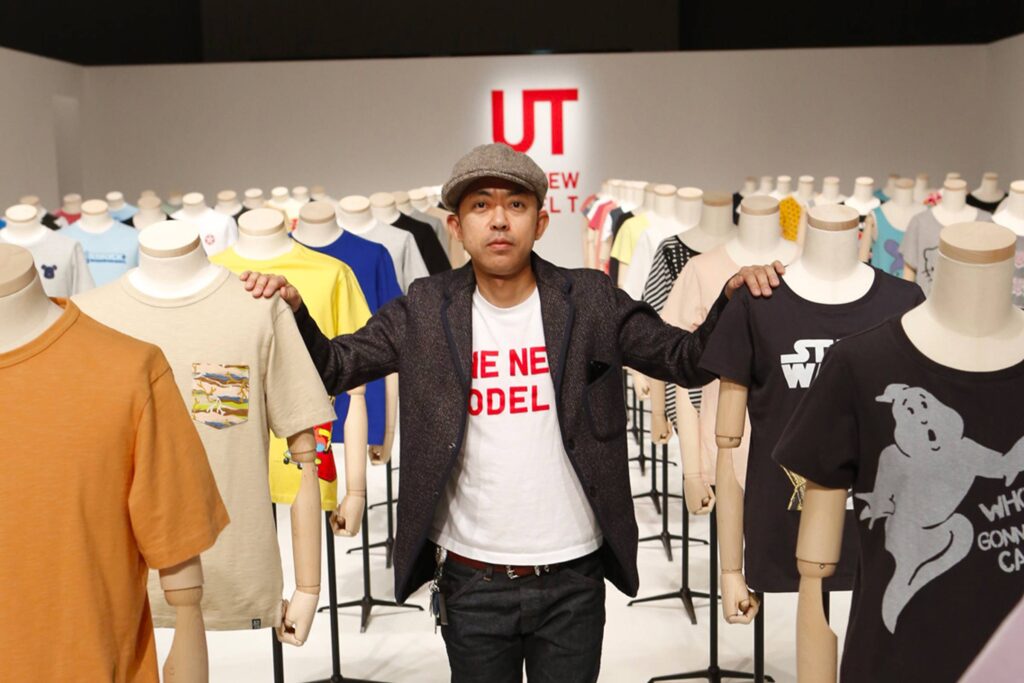
Cross-Promotion Opportunities: Partnerships allow both sides to benefit from mutual advertising efforts. Collaborators may feature Uniqlo products in their social media posts or websites, while Uniqlo promotes its tie-ups via email newsletters, Instagram stories, and in-store displays. This cross-promotional synergy amplifies public awareness and drives sales.
Storytelling Potential: Collaborations present opportunities for narrative storytelling through editorial content or video productions. Uniqlo shares insights into creative processes, inspiration sources, and backstories behind collaborations, humanizing the brand and fostering emotional connections with customers.
Adaptability to Emerging Trends: Uniqlo stays agile by responding to evolving consumer interests and tapping into current movements. Its recent ventures include sustainability-focused collabs with environmental activists groups like Common Objectives and The Nature Conservancy. By associating with eco-conscious organizations and incorporating environmentally friendly practices into its supply chain, Uniqlo positions itself as a responsible corporate citizen catering to socially conscious shoppers.
In summary, Uniqlo utilizes collaborations and limited editions as effective marketing strategies by providing exclusive merchandise, extending core values, expanding customer bases, facilitating cross-promotion, telling engaging stories, adapting to trending topics, and showcasing commitment to sustainability. These tactics help the brand stay relevant, appeal to diverse markets, and remain at the forefront of global fashion retail.
Global Store Expansion:
Uniqlo’s marketing strategy includes a robust global expansion plan. The brand strategically opens flagship stores in prominent fashion capitals and high-traffic urban areas worldwide.
These flagship stores serve as iconic landmarks and generate substantial foot traffic, allowing Uniqlo to reach a wider audience and create a strong physical presence in key markets.
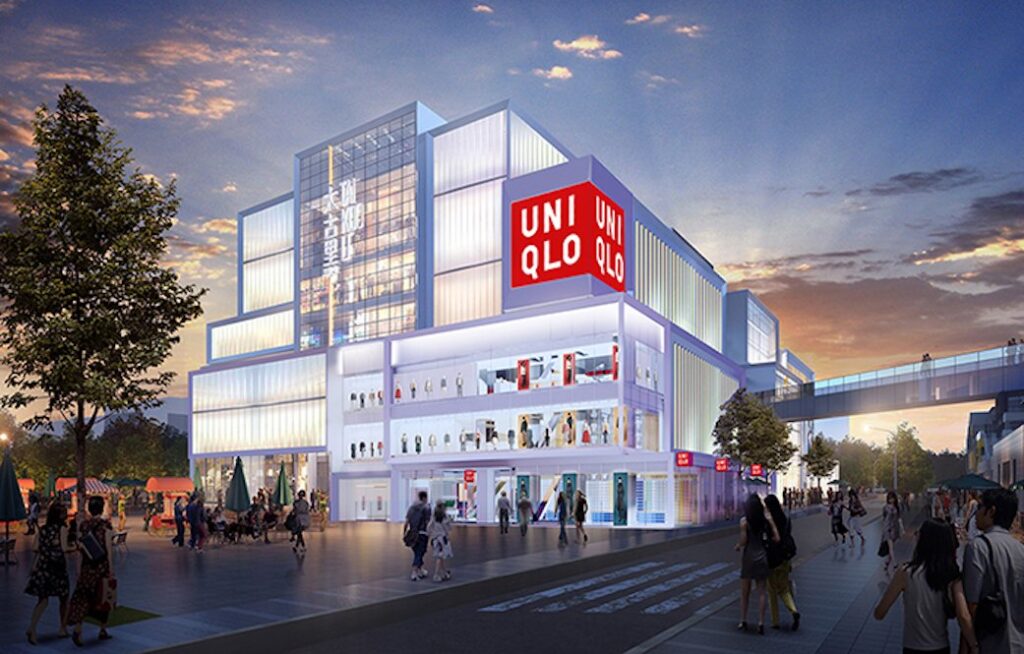
Omni-Channel Approach:
Omni-channel marketing is a customer-centric approach in which all channels are integrated so the customer has a unified and consistent experience whether they are at a physical store, using an app, or on a website.
Uniqlo has been a pioneer in omni-channel marketing, and the company has implemented a number of innovative strategies to create a seamless shopping experience for its customers.
One of Uniqlo’s most successful omni-channel strategies is its mobile app. The app allows customers to shop online, check inventory in stores, and even reserve items for in-store pickup. The app also includes features that allow customers to scan QR codes in stores to learn more about products, and to create wish lists and share them with friends.
Another key component of Uniqlo’s omni-channel strategy is its brick-and-mortar stores. Uniqlo’s stores are designed to be interactive and engaging, and they offer a variety of services that make it easy for customers to shop. For example, Uniqlo stores have touchscreen kiosks that allow customers to browse the company’s entire catalog, and they also have dressing rooms that are equipped with Wi-Fi so that customers can check out products online while they are trying them on.
Uniqlo’s marketing strategies are built on a foundation of innovation, functionality, and global appeal. By emphasizing its LifeWear philosophy, leveraging innovative fabric technology, and engaging in strategic collaborations, Uniqlo has cemented its position as a beloved and accessible fashion brand worldwide. Through its omni-channel approach and commitment to sustainability, Uniqlo continues to set new standards in the fashion industry, appealing to diverse audiences and redefining the concept of everyday fashion.
Marketing Mix of Uniqlo
The marketing mix of Uniqlo, commonly referred to as the 4Ps, encompasses the key elements that the brand utilizes to effectively market its products and build its global presence. Let’s explore the detailed components of Uniqlo’s marketing mix:
Product:
Uniqlo’s product strategy revolves around its core philosophy of “LifeWear” – providing functional and high-quality clothing that enhances everyday life. The brand offers a wide range of products for men, women, and children, including:
- Apparel: Uniqlo’s clothing lines encompass a variety of wardrobe essentials, from basic t-shirts and jeans to sophisticated workwear and outerwear. The brand’s designs emphasize simplicity, versatility, and timeless style, appealing to a broad consumer base.
- Innovative Fabrics: Uniqlo is renowned for its use of innovative fabric technology, such as HEATTECH (heat-retaining fabric), AIRism (moisture-wicking and breathable fabric), and Ultra Light Down. These fabrics add value to the products and address specific customer needs, enhancing the overall appeal of Uniqlo’s offerings.
- Collaborations and Limited Editions: Uniqlo collaborates with designers, artists, and pop culture icons to create exclusive and limited-edition collections. These collaborations create excitement, generate buzz, and attract fashion enthusiasts and collectors.
Price:
Uniqlo’s pricing strategy aligns with its brand positioning of providing affordable and high-quality clothing. The brand offers value for money, providing customers with well-crafted products at competitive prices.
While not as high-end as some luxury fashion brands, Uniqlo’s prices are justified by the quality of its products, innovative fabrics, and modern design aesthetics. This pricing strategy appeals to a wide range of consumers seeking accessible yet stylish and functional clothing.
Promotion:
Uniqlo’s promotion strategy focuses on building brand awareness, engaging with customers, and creating a sense of community. Key elements of Uniqlo’s promotional efforts include:
- Advertising Campaigns: Uniqlo runs visually captivating and emotionally engaging advertising campaigns that showcase its clothing and fabric innovations. The brand leverages both traditional media and digital platforms for its advertisements.
- Social Media and Content Marketing: Uniqlo actively engages with its audience on social media platforms like Instagram, Twitter, and Facebook. The brand shares visually appealing content, behind-the-scenes glimpses, and product updates, creating a strong digital presence.
- Collaborations and Influencer Marketing: Uniqlo’s partnerships with designers and collaborations with influencers contribute to its promotional efforts, amplifying its reach and appeal to a broader audience.
Place:
Uniqlo’s distribution strategy ensures its products are widely accessible and available in prominent fashion markets worldwide. Key distribution channels include:
- Brick-and-Mortar Stores: Uniqlo operates an extensive network of physical stores, including flagship stores in major fashion capitals and high-traffic urban areas. These stores provide a unique and immersive shopping experience, enhancing the brand’s presence.
- Online Store: Uniqlo’s e-commerce platform complements its physical retail presence, allowing customers to explore collections, make purchases, and access exclusive content from anywhere at any time. The online store caters to a global audience, contributing to the brand’s international success.
- Department Stores and Collaborations: Uniqlo products are also available through partnerships with department stores and other retailers, expanding its reach and accessibility in various markets.
Uniqlo’s marketing mix is designed to effectively communicate its philosophy of providing functional and high-quality clothing for everyday life. By focusing on innovation, affordable pricing, strategic promotions, global expansion, and efficient retail processes, Uniqlo has successfully positioned itself as a global fashion powerhouse, appealing to a diverse and international customer base.
Also Read: Elevating Luxury: Decoding Prada Marketing Strategies and Mix
To read more content like this, subscribe to our newsletter

